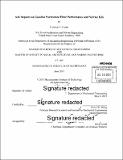Ash impacts on gasoline particulate filter performance and service life
Author(s)
Custer, Nicholas C
DownloadFull printable version (9.632Mb)
Other Contributors
Massachusetts Institute of Technology. Department of Mechanical Engineering.
Advisor
Victor W. Wong.
Terms of use
Metadata
Show full item recordAbstract
New regulations in the United States and Europe, designed to address climate change concerns by reducing greenhouse gas emissions, are causing increased use of gasoline direct-injection (GDI) engines in light-duty vehicles (LDV). Separate new regulations that aim to reduce particulate emissions to address air pollution concerns are taking effect concurrent with greenhouse gas limitations in both jurisdictions. GDI engines are proven to create more particulate emissions than previously utilized port-injection technology. Increasing particulate emissions rates combined with falling regulatory particulate emissions limits requires new strategies to reduce these emissions from gasoline powered LDVs. Particulate filters have been successfully implemented to reduce particulate emissions from diesel engine exhaust for over a decade. Diesel particulate filters have a demonstrated filtration efficiency of 95% or greater and have reduced diesel particulate mass (PM) emissions by one to two orders of magnitude. GDI engines require no more than one order of magnitude reduction in particulate emissions to meet new regulations. Existing particulate filter technology in use in diesel vehicles is capable of reducing GDI engine emissions to new regulatory levels; however, it is proposed that these reduction may be achievable through means other than gasoline particulate filters (GPF). A GPF will create an additional back-pressure in the engine exhaust system that will reduce engine power and efficiency. This backpressure will increase as PM is trapped in the filter and decrease as combustible PM removed. A buildup of incombustible ash present in engine-out PM will increase the baseline backpressure of the filter during the course of its service life. It is important to understand the impact of ash on the filter pressure drop performance before implementing GPF to meet new emissions regulations. This study builds on existing diesel particulate filter technology and demonstrates through experimental results the mechanisms by which ash increases GPF pressure drop. Ash deposits are also shown to increase the light-off temperature of three-way catalyst coatings in GPF.
Description
Thesis: S.M. in Mechanical Engineering, and S.M in Naval Architecture and Marine Engineering, Massachusetts Institute of Technology, Department of Mechanical Engineering, 2015. Cataloged from PDF version of thesis. Includes bibliographical references (pages 71-74).
Date issued
2015Department
Massachusetts Institute of Technology. Department of Mechanical EngineeringPublisher
Massachusetts Institute of Technology
Keywords
Mechanical Engineering.